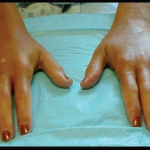It’s been no small feat to further patient empowerment and self-management to achieve better disease control within the sometimes difficult setting of the National Health Service, notes Dr. Richards. “There are two approaches that she has taken—one is that if you treat rheumatoid arthritis aggressively and early with conventional drugs, you have a much smaller need for biologics,” he says. “I think if patients don’t have access, their disease gets worse, and you end up spending more on your drug budget. So she saves money on drugs by rapid access and aggressive early treatment and tight control.”
Another advantage to Cornell’s approach is that she identifies the patients who need to be seen more frequently and those who can be seen less frequently, Dr. Richards notes. “If you’ve got longstanding, stable rheumatoid arthritis, instead of seeing them in three months, she’ll see them yearly but still give them access if they’re in trouble,” he says. “And she’ll free up spaces by prioritizing those that need to be seen frequently. She doesn’t bankrupt us, thankfully!”
Challenges Remain
Careful attention to budget issues will be crucial in the coming period for rheumatology and all those working in the National Health Service, Cornell believes. It will be important, she says, to “make sure that government is aware of the consequences of ignoring chronic disease. I think we have been the ‘poor relations’ before now, because [the majority of] funding has gone to cardiac disease, diabetes, and cancer.” General misperceptions about inflammatory arthritis persist among the lay public as well as governmental officials, she notes. “You might think that because arthritis is a chronic disease that it is a ‘cheap’ disease and that you don’t need to put much funding into it. But, in fact, it can be expensive because, in the long term, these people have massive problems with mobilization and often end up needing joint replacement surgery.” It’s also been shown that 40% of those with rheumatoid arthritis lose their jobs within the first two years of diagnosis, resulting in lost productivity and lost human capital while adding to the strain on the healthcare delivery system.
Trish Cornell now serves on the European League Against Rheumatism’s Scientific Committee and continues to raise the national and international profile of nursing as well as her own achievements. Nevertheless, when told that she had been selected for a profile article in The Rheumatologist, she responded modestly: “But I’m not an academic. I’m very much a clinical worker, and I’ve just tried to forward the cause for rheumatology nursing.”


